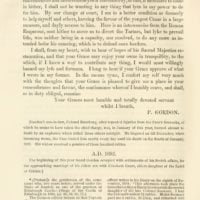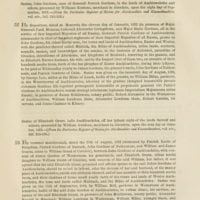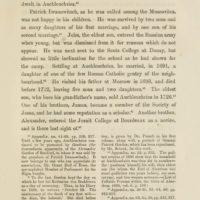
Related

XX PREFACE. family debts, that Patrick Gordon makes his first appearance.

XXXVl CONTENTS. The Czar returns to Moscow. His thanks to Gordon. Farther punishment of the Strelitzes

226 INDEX OF PERSONS. Gordon, Mary, daughter of General Patrick Gordon

Empress Alexandra Feodorovna in hussar uniform
![1690] DIARY OF PATRICK GORDON. 107 their arrival was announced. Gordon was at once admitted to His Majesty](https://cdn2.picryl.com/thumbnail/1699/12/31/1690-diary-of-patrick-gordon-107-their-arrival-was-announced-gordon-was-at-a59a57-200.jpeg)
1690] DIARY OF PATRICK GORDON. 107 their arrival was announced. Gordon was at once admitted to His Majesty

174 DIARY OF PATRICK GORDON. [1692 be restored. As for Harie Gordon

CONTENTS. XIX Lieutenant Adam Gordon and other Scots

APPENDIX. 213 Sasine, John Gordone, sone of Generall Patrick Gordone

PREFACE. xxi grave, his grandson was a landless man, and another race of Gordons dwelt in Auchleuchries
CONTENTS. xxxi Gordon dresses himself after * the new fashion,' and makes his farewell visits
Summary
Passages from the diary of General Patrick Gordon of Auchleuchries : A.D. 1635-A.D. 1699"
CONTENTS. xxxi
Gordon dresses himself after * the new fashion,' and makes his farewell visits 88
Prince Rupert. The King. The Duke of York. Lord Clarendon 89
Last audience of the King. His letter to the Czar 90
Baron d'Isola. Another supper at the Cock. Mass at St. James's. Letter to Sir
William Coventry 93
Supper with Lieutenant-General Drummond at the Bear. James Burnet of Leys 94<
Voyage from Dover to Nieuport 95
Bruges. The English Austin Canonesses 95
Ghent. The English Nunnery. The Cathedral. Antwerp. Voyage to Enkhuizen.
Leuwarden. Dokkum. Groningen , ^ 96
Voyage from Delfzyl to Glucksfadt 97
Journey to Hamburg. The waggon takes fire. Steelhand.... 98
Altona. Field-Marshal Wurtz 99
Interview with Queen Christina of Sweden 100
Journey from Hamburg to Lubeck 101
Voyage from Travemunde to Riga 102
Arrival at Moscow. Falls into disgrace with the Czar 103
A gap often years in the Diary , ... 104
A.D. 1670-I676_8etat. 35-41.
Service in the Ukraine against the Cossacks 104
A.D. 1677— sefat. 42.
Defence of Tschigirin. Expulsion of the Turks from the Ukraine 104
A.D. 1678— setat. 43.
Renewed efforts for leave to quit Russia. The Czar Feodor 105
The Twenty-ninth of May in the Ukraine 105
Second defence of Tschigirin against the Turks and Tartars 105
Gordon blows up the magazine, and escapes. He is made Major-General 107
A chasm of five years in the Diary 107
A.D. 1679-1684— eetat. 44-49.
He is appointed to the chief command at Kiew 108
He is made Lieutenant-General 108
Death of the Czar Feodor. His brothers, the Czars Ivan and Peter. The Princess
Sophia. Her favourite Golizyn. Le Fort 108
Death of Gordon's son, George Stephen. Latin epitaphs 108
A.D. 1685— aetat. 50.
Death of King Charles H 109
Defeat of the Earl of Argyle and the Duke of Monmouth 109
Gordon gets leave to visit England 109
A.D. 1686— Eetat. 51.
His first interview with the Czar Peter...., 110
Gordon was brought up and remained a lifelong Roman Catholic, at a time when the Church was being persecuted in Scotland. At age of fifteen, he entered the Jesuit college at Braunsberg, East Prussia, then part of Poland. In 1661, after many years experiences as a soldier of fortune, he joined the Russian army under Tsar Aleksei I, and in 1665 was sent on a special mission to England. After his return, he distinguished himself in several wars against the Turks and Tatars in southern Russia. In recognition of his service he was promoted to major-general in 1678, was appointed to the high command at Kiev in 1679, and in 1683 was made lieutenant-general. In 1687 and 1689 he took part in expeditions against the Tatars in the Crimea, being made a full general. Later in 1689, a revolution broke out in Moscow, and with the troops under his command, Gordon virtually decided events in favor of Peter the Great against the Regent, Tsarevna Sophia Alekseyevna. Consequently, he was for the remainder of his life in high favor with the Tsar, who confided to him the command of his capital during his absence from Russia. In 1696, Gordon's design of a "moveable rampart" played a key role in helping the Russians take Azov. One of Gordon's convinced the Tsars to establish the first Roman Catholic church and school in Muscovy, of which he remained the main benefactor and headed the Catholic community in Russia until his death. For his services his second son James, brigadier of the Russian army, was created Count of the Holy Roman Empire in 1701. At the end of his life the Tsar, who had visited Gordon frequently during his illness, was with him when he died, and with his own hands closed his eyes. General Gordon left behind him a uniquely detailed diary of his life and times, written in English. This is preserved in manuscript in the Russian State Military Archive in Moscow. Passages from the Diary of General Patrick Gordon of Auchleuchries (1635–1699) was printed, under the editorship of Joseph Robertson, for the Spalding Club, at Aberdeen, Scotland, 1859.
